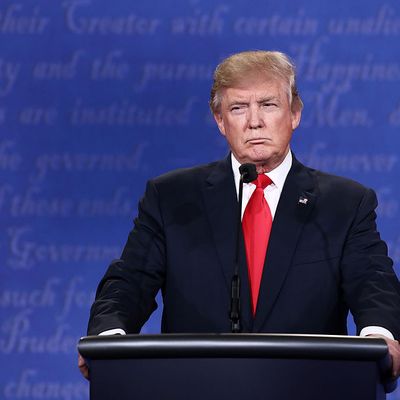
Despite the built-in favors it has done for him at the national level, the president harbors a strong distrust for the “rigged” American electoral process, refusing to say if he’d accept a loss at the polls in 2016; claiming massive, if totally unsubstantiated, voter fraud upon winning; and sidelining the regulatory Federal Election Commission prior to his reelection bid. According to the New York Times, there’s another election-related entity Trump doesn’t trust: the Commission on Presidential Debates. Because the president does not trust the nonprofit that sponsors the debates, his advisers told the Times that he is considering skipping them altogether.
Though a head-to-head between the eventual Democratic nominee and the incumbent is months away, his team doesn’t seem to be too concerned by the thought: One senior adviser “seemed to wince” at a debate-related question. Nor is the Trump campaign worried about the nominee to debate: The Times reports that the president is less concerned about his opponent than he is about “which media personality will be chosen as the debate moderator.”
This calculation might not be off — and not just because the architecture of Trump’s argument isn’t likely to become much more complicated than claiming his opponent is “sleepy,” boasting about the economy, and ridiculing impeachment. In 2016, the Republican candidate gained a notable boost during NBC News’ Commander-in-Chief Forum when host Matt Lauer grilled and interrupted Hillary Clinton, while allowing Trump to ramble without directly answering questions. Clinton also enjoyed polling bumps following all three debates, and the 2020 Democratic nominee will have the advantage of going through 12 primary debates to warm up their skills. And if Trump is successfully able to pre-complain his way into influencing the choice of moderator, a friendly — perhaps Fox Corporation–employed — host could help assuage Trump’s post-debate feelings that he was at a disadvantage last time around.
If the president does opt out of the debate process, it could have a substantial impact on the Democratic primary: Post-debate criticisms of front-runner and former vice-president Joe Biden have included fears of how he would perform onstage with Trump. As the New York Times Astead Wesley notes:
Critics were quick to cast doubt on Trump’s plan. “Not doing any [debates] would not be strategically smart,” former Clinton adviser Philippe Reines told the Times, anticipating that he will “bluff that he won’t do any with the goal of only having to do one.” But NYU historian Ruth Ben-Ghiat provides a strong argument for why bailing from the debates fits within Trump’s autocratic evolution:
Considering the president’s prior behavior, the threat isn’t empty either. In January 2016, Trump skipped the final Republican primary debate prior to the Iowa caucuses because it was moderated by Megyn Kelly, who he was sparring with after his misogynistic claim that she had “blood coming out of her wherever.” (This was his deft response to Kelly’s accusation that he was sexist at a debate in August 2015.) In March 2016, Trump was able to shut an entire debate down after bailing on the event in Salt Lake City; John Kasich refused to join without the front-runner, and Fox News mercifully canceled to avoid two hours of Ted Cruz onstage by his lonesome.






























